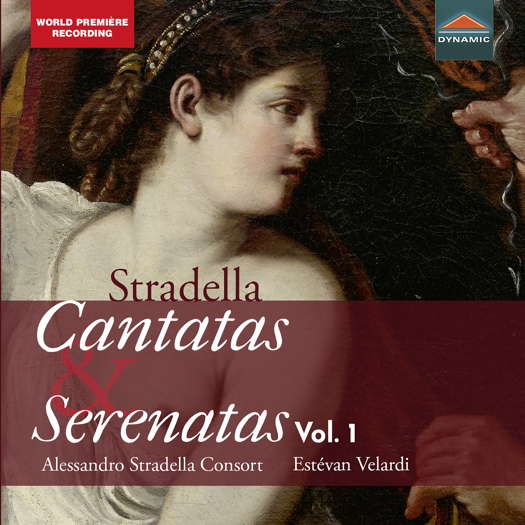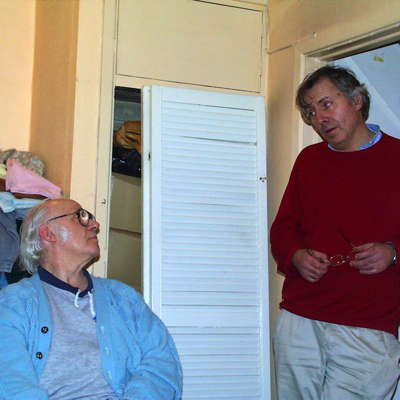 UPDATES: There's a new feature every day at Classical Music Daily. Read about the various ways we can keep in touch with you about what's happening here.
UPDATES: There's a new feature every day at Classical Music Daily. Read about the various ways we can keep in touch with you about what's happening here.

Sensual Serenades
GIUSEPPE PENNISI listens to music by Stradella
'... an excellent way to get to know Stradella ...'
Antonio Alessandro Boncompagno Stradella (Bologna, 3 July 1643 – Genoa, 25 February 1682) was an Italian composer of the middle Baroque period. He enjoyed a dazzling career as a freelance composer, writing on commission, and collaborating with distinguished poets, producing over three hundred works in a variety of genres. Outside Italy, the little that is known about his life is more than what is known about his music, quite seldom performed.
He was from an aristocratic Tuscan family, educated in Rome, and was already making a name for himself as a composer at the age of twenty-four. In 1667, he composed a Latin oratorio for the Confraternity of Crocifisso di San Marcello and in the following year the serenata La Circe for the Princess of Rossano Olimpia Aldobrandini Pamphilj. In 1671-72 he collaborated in staging some operas, two by Francesco Cavalli and two by Antonio Cesti, at the Tordinona Theatre, composing prologues, intermezzos and new arias. In the early 1670s, he also composed some operas which were performed in private theatres of aristocratic families.
During the same period, Stradella began to live a dissolute life. With Carlo Ambrogio Lonati, he attempted to embezzle money from the Roman Catholic Church, but was found out: he fled the city, only returning much later when he thought it was safe. His numerous incautious affairs with women began to make him enemies among the powerful men of the city, and he had to leave Rome for good.
In 1677, he went to Venice, where he was hired by a powerful nobleman, Alvise Contarini, as the music tutor to his mistress, Agnese Van Uffele. She and Stradella began an affair and fled Venice together for Turin, where the Regent of Savoy protected them. Contarini followed and instructed the Archbishop that Uffele and Stradella must marry or that Uffele must take the veil. She did the latter, and then the two married in October; however, as Stradella left the convent after signing the marriage contract, he was attacked from behind on 10 October by two would-be hired assassins, who believed him dead when they left him in the street. He was not. The two assassins took asylum with the French ambassador. That Contarini had hired the attackers became known, leading to complaints from the Regent of Savoy to Louis XIV; the matter became a topic of negotiation between the courts. In 1678 Stradella fled to Genoa, where he met again with Lonati. In 1682, he was stabbed to death at the Piazza Banchi. A nobleman of the Lomellini family hired the killer that put an end to Stradella's life, although the identity of the killer was never discovered.
This adventurous life was the subject of three romantic operas: Stradella by Louis Niedermeyer (debut: Paris 1837), Stradella by César Franck (completed in 1841 but performed only well into the twentieth century) and Alessandro Stradella by Friedrich von Flotow (debut: Hamburg, 1844).
Stradella was an extremely influential composer at the time. He wrote at least six baroque operas including a full-length comic opera. He also wrote more than one hundred and seventy cantatas and six oratorios.
In Italy for several years, a Rome-based ensemble lead by Andrea De Carlo has made its mission to make Stradella's music better known. The ensemble is very active and runs an annual festival.
This CD is the product of a different ensemble, the Stradella Consort led by Estévan Velardi: established in 1987 as Camerata Ligure, the ensemble of instrumentalists and singers changed its name to the Stradella Consort recently. Both groups play on period instruments. The Stradella Consort has already published half a dozen Stradella CDs, mostly operas and oratorios.
This is a premiere recording and the first volume of a series dedicated to cantatas and seneratas. As can be expected, due to Stradella's own complicated love and sex life, the four selected for this CD are quite sensual. I can say that generally, they deal with women seduced and abandoned by a sexual lover, perhaps Stradella himself.
The first cantata, Arsi già d'una fiamma, is a resentful lament of an abandoned woman against Love. The protagonist is a solo soprano voice with two other sopranos as echos. The final trio highlights the main character's fluctuating feelings.
Listen — Alessandro Stradella: Così va chi segue beltà (Arsi già d'una fiamma)
(track 8, 1:15-1:49) ℗ 2021 Dynamic Srl :
The second piece is a serenata - Or ch'alla dea notturna - for soprano and tenor about senses, lack of loyalty and betrayal with an almost operatic flair.
Listen — Alessandro Stradella: Urti pure in duro scoglio (Or ch'alla dea notturna)
(track 19, 1:17-1:50) ℗ 2021 Dynamic Srl :
Then there is a cantata for soprano solo - Disperata rimembranza, lascia ormai - based on recurrent thematic cells. The woman recalls sensual love with a complex vocalizing made from arias, arioso and recitative. The final aria is impressive.
Listen — Alessandro Stradella: Disperata rimembranza, lascia omai
(Disperata rimembranza, lascia ormai)
(track 31, 0:00-0:54) ℗ 2021 Dynamic Srl :
Finally, a serenata, Infinite son le pene, for three voices - a soprano, a tenor and a bass - of nearly twenty minutes, with an introductory overture (in three tempos), arias, duets and trios. This is almost a short opera, as indicated by the sumptuous sinfonia.
Listen — Alessandro Stradella: Sinfonia (Infinite son le pene)
(track 32, 0:24-1:14) ℗ 2021 Dynamic Srl :
The duet is impressive.
Listen — Alessandro Stradella: O' del cielo d'amor (Infinite son le pene)
(track 36, 0:00-0:29) ℗ 2021 Dynamic Srl :
The final trio is enthralling.
Listen — Alessandro Stradella: Lasciatemi una volta (Infinite son le pene)
(track 41, 1:28-2:05) ℗ 2021 Dynamic Srl :
To sum up, this is an excellent way to get to know Stradella for those not familiar with his music, and for all to enjoy the Stradella Consort's performances.
Copyright © 7 August 2021
Giuseppe Pennisi,
Rome, Italy

CD INFORMATION - STRADELLA: CANTATAS AND SERENATAS



